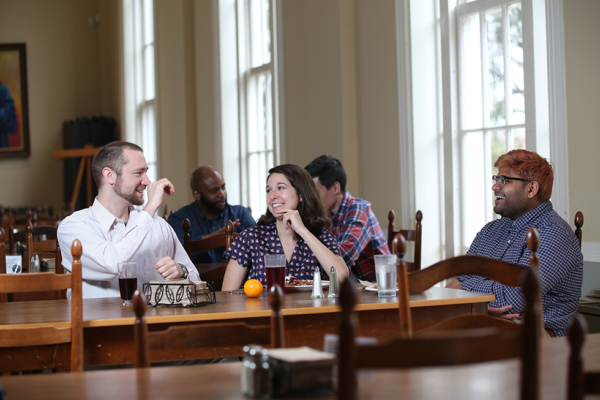Tuition Free, Housing Free, Meal Plan Free for All Made Possible with Expanded Financial Aid at Virginia SeminaryPosted Apr 1, 2019 |
Virginia Theological Seminary (VTS) is delighted to announce an expanded and simplified financial aid application and award process that will allow anyone with assets less than $200,000 (excluding one’s primary home and any pensions) have the costs of education covered.
 “Expanding and simplifying our financial aid packages is an investment in the future of the Episcopal Church,” said the Very Rev. Ian S. Markham, Ph.D., dean and president of VTS. “Many institutions are going tuition free, but we are going tuition free, housing free, meal plan free, and making a substantial contribution to healthcare.”
“Expanding and simplifying our financial aid packages is an investment in the future of the Episcopal Church,” said the Very Rev. Ian S. Markham, Ph.D., dean and president of VTS. “Many institutions are going tuition free, but we are going tuition free, housing free, meal plan free, and making a substantial contribution to healthcare.”
In a move that will help ensure the Seminary’s goal of making theological education accessible to all, effective immediately, all students applying for financial aid for Fall 2019 with a combined adjusted gross income (single/family) less than $150,000 annually and/or combined assets less than eight times the respective Cost of Residency category (see below) will receive a package that includes:
• The cost of tuition;
• The cost of housing;
• The cost of a meal plan (for single students – three meals weekday, for all others – the lunch-only plan); and
• A maximum contribution of $4,000 towards healthcare cost for those selecting the VTS sponsored health insurance plan.
“With this step, VTS has made it possible for students to attend seminary without taking out educational loans to cover tuition, room, or board,” said the Rt. Rev. James R. Mathes, associate dean of students. “Most students should be able to graduate from VTS debt-free.”
To qualify, all students must apply for financial aid to be considered for this award package. Assets to be considered for the Cost of Residency requirement are: Cash and Cash Equivalents, Stocks, Bonds, and Real Estate Holdings. Primary Residence and Pension/Retirement accounts will not be considered. Cost of Residency categories are defined as follows:
• Single students: $24,200;
• Students living in a one-bedroom apartment: $34,100;
• Students living in a two-bedroom apartment: $36,500;
• Students living in a three-bedroom apartment or house: $38,900;
• Students that cannot live on the campus and live in rented accommodation off-campus: $41,300.
“We are thrilled to be able to offer such comprehensive scholarship packages to our students and to make theological education accessible for all,” said Jacqueline Ballou, CPA, MBA vice president for Finance and Operations.
Any student electing to live off-campus when on-campus housing is available will not be eligible for housing accommodation but will be eligible to receive an award to cover tuition, fees, and meal plan. Each student will be required to present an annual budget of living expenses. This budget should clearly identify the sources that will be used to meet all other financial obligations during residency.
“Student debt has become a multi-generational burden,” added Dean Markham. “VTS is in a fortunate position to make a difference. This is the right thing to do.”
####
ABOUT VTS
Founded in 1823 as a beacon of hope in a country new and finding its way, Virginia Theological Seminary has led the way in forming leaders of the Episcopal Church, including: the Most Rev. John E. Hines (VTS 1933, D.D. 1946), former presiding bishop of the Episcopal Church; the Rt. Rev. John T. Walker (VTS 1954, D.D. 1978), the first African-American bishop of the Episcopal Diocese of Washington; and theologian, author and lay preacher Ms. Verna J. Dozier (VTS D.D. 1978). Serving the worldwide Anglican Communion, Virginia Theological Seminary educates approximately 25% of those being ordained who received residential theological education. Visit Virginia Seminary online at www.vts.edu.

Social Menu